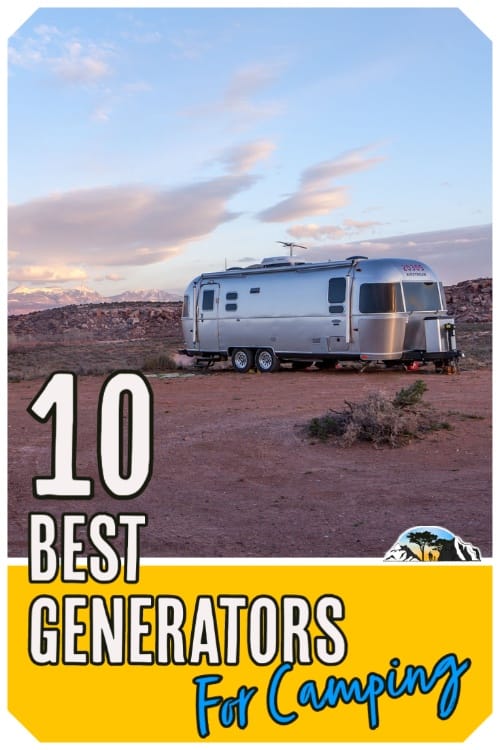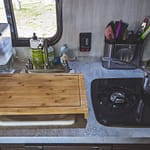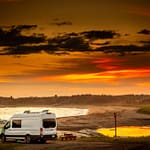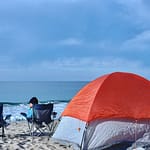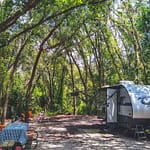There are a lot of portable generators for motorhomes, caravans, or campsites available in the market, but certain features need to be weighed so that you get the best generator suitable for your needs. The basic rule of thumb is that you need to decide your power requirement for the campsite. After you have done that, you can look for the smallest generator that best fits those requirements.
If you don’t want to go through the hassle of searching through the market for the best fit, you’re in luck. For here’s a well-researched list of 10 of the best generators for camping trailers, and there’s a high chance you’ll find your perfect choice in it.
This post may contain affiliate links. Visit the Disclaimer page for more information.
Summary Table: Best Generator for Camping Trailer
The table below enlists my picks and some objective information about them. I will discuss each of these items in further detail to help you make an informed decision.
| Product Photo | Name | Wattage (Watts) | RV Ready? | Cost |
|---|---|---|---|---|
 | Jackery Portable Power Station Explorer 1000 | 200 | No | Check Price |
 | MAXOAK Portable Power Station BLUETTI EB150 | 1000 | No | Check Price |
 | Honda EU1000i Inverter Generator | 1000 | No | Check Price |
 | WEN 56203i Super Quiet 2000-Watt Portable Inverter Generator | 2000 | No | Check Price |
 | Yamaha EF2400iSHC | 2000 | No | Check Price |
 | WEN 56380i Super Quiet 3800-Watt Portable Inverter Generator | 2000 | No | Check Price |
 | Westinghouse iGen2200 | 2200 | No | Check Price |
 | PAXCESS portable generator | 330 | No | Check Price |
 | CHAMPION 4000-Watt RV Ready DH Series | 4000 | Yes | Check Price |
 | Briggs & Stratton P3000 Power Smart Series | 3000 | Yes | Check Price |

Reviews: 10 Best Generator for Camping Trailer
1. Jackery Portable Power Station Explorer 1000
Jackery has been introducing power stations of enhanced power capacity for quite some time. But their portable power station Explorer 1000 is the best one yet. The unit shows off a 1002 Watt-hour capacity lithium-ion battery and three power outlets with a surge output of 2000W. You also get dual 12V USB-C ports along with the usual pair of Type-A USB ports. You can also hitch your car accessories to the generator as well.
This portable power explorer also has a control panel that shows the remaining battery and power output. The panel has a backlit display whose source LED is played at the end with the cooling vent. You can use this LED as a flashlight during your camping nights.
Here is the best part. This power station only weighs 22 pounds, which is quite astonishing when you experience its massive power output. It obviously doesn’t weigh like a feather, but in a market for portable generators, that’s a big add-on.
You can easily carry it around, not just because it’s comparably lighter but also because it comes with a properly sculpted handle integrated within the unit.
This generator comes with a tri-rechargeable modality which means you can charge it through an AC adapter, a 12V car adapter, or a solar panel. The unit comes with everything you need to charge your generator whichever way it suits you.
The Explorer 1000 can run many gadgets like tablets, laptops, smartphones, and even a few appliances. If you have multiple devices at once that you need to be charging, then the Explorer 1000 can do that for you and long as their combined power is under 1000W.
PROS
CONS
Related: RV BATTERY FOR DRY CAMPING
2. MAXOAK Portable Power Station
MAXOAK Bluetti Portable Power Station uses durable lithium-ion batters to sustain a varied amount of appliances. The station can be recharged passively. The station has been designed end to end; from the outside, the design has been rendered to encapsulate the batteries from any external damage or just being moved around roughly while the camper jostles on. The casing for the batteries even allows for the heat to escape.
The casing of the generator also comes with a backlit LCD display which shows the battery status so that you can quickly prioritize which of the appliances to charge.
The generator’s case has space for grip at the top, which makes it easily transportable. The whole appliance weighs 37.9 pounds. Comparatively, this weighs more than a lot of generators while being lower-capacity.
The generator comes with an additional battery management system designed to shield the batteries and your appliances from getting flooded with exceeding voltage. It also acts to regulate the temperature to avoid any meltdowns. The generator has a feature that automatically shuts off the generator when the station has been fully charged. This safety feature adds appreciable value to the generator pack.
Let’s talk about its power capacity. MAXOAK’s Portal power station can store up to 1500 watt-hours in its battery pack. This watt-hour capacity signals towards the generator’s functionality of boosting high-power devices, such as laptops, cellphones, cameras, car vacuum cleaners, small refrigerators, and even TVs (but all that depends on the power draw capacities).
The power station also comes with some connection ports for you to charge multiple devices at once. In addition to three USB-A ports, it also has a USB-C port which is quite an ease when it comes to modern devices.
This generator also has two options for charging. You either plug it into a wall, or you can use a solar panel to the juice.
PROS
CONS
3. Honda EU1000i Inverter Generator
Honda’s inverter generator has a GHX50 4-stroke 49cc engine which is akin to a whopping power packed in a little package. You will have 3.8 hours of run time with this generator before you have to refuel its 0.6-gallon gas tank. But that’s when you are using it at full capacity. When you are only using it at around 25% to 50% capacity, then you can enjoy a run time of 8 hours or even more.
Honda usually launches products that are very much prized for their reliability, performance, not to mention the recognition they get for their appliances. Most people go for Honda’s Generator because they have an incredibly lower level of noise. When the generators are working at half their level of capacity, the noise they produce is around 53dBA. And now, when you run it at full capacity, you are only going to notice an increase of 4dBA. Now some of our readers would know what that means, but for those who cannot gauge what this noise level signifies, try imagining the sound produced by a normal conversation. That’s how noisy this generator can get at full capacity.
Its peak load capacity is 1000W, which means that you can use it for laptops, sound systems and TV, and other small appliances with the inverter’s safe electricity. Please keep in mind that with heavy appliances, you won’t be able to run anything else at the same time with it. It’s best to avoid using the heavy appliances with it, though.
The generator also comes with a functionality whereby you can run another generator in tandem to increase the power of the whole apparatus.
It’s a portable generator, so you might be wondering how much it weighs. The generator weighs only 29 pounds which is quite a feature for a portable generator.
PROS
CONS
Related: Best Travel Trailer for Dry Camping
4. WEN 56203i Super Quiet 2000-Watt Portable Inverter Generator
WEN 56203i 2000-Watt inverter generator has a weight of only 39 pounds which aids in easy portability. It also comes with an in-built handle that makes transport easier. This Generator is CARB compliant, and EPA certified. Even though it is a very compact generator, it has some outlets that aid in your convenience. It has a total number of 6 outlets for multi-purposes.
The generator also has a feature whereby you can connect parallel plugs. You can use the parallel connection kit to hitch another 56203i generator to enhance the output.
This portable generator has a 120V twist-lock to power your camper; it runs on gasoline which is available almost everywhere and affordable.
On 50%, the run time would be around 7 hours. The generator also comes with the fuel shut-off feature that makes sure all the fuel has been used before it turns off the fuel flow before it shuts off the generator. This feature also helps increase the generator’s lifespan. You could call it the unit’s lifespan as it uses up the remainder of the fuel in the carburetor.
The size of the tank is one gallon which is quite impressive. It also comes with a built-in mode where you could adjust the fuel consumption.
Another selling point for this generator is its 1.2 total harmonic distortion which means that it can provide you cleaner energy without making you experience any fluxes. And as per the US Department of Health and Human Services, the generator’s noise during its operations is comparable to the noise generated by a normal conversation.
The bad thing about this generator is that it doesn’t have an electric start. The run time is not as appreciable because you have other generators in the market which provide a lengthier run time. Moreover, it only tends to power small appliances. Another drawback of it is that if you are camping at an altitude of above 2000ft, you will have to use the generator with an altitude kit. Lastly, it’s gonna have you changing the oil more often than you might think.
PROS
CONS
Related: Best Portable Radio for Camping
5. Yamaha EF2400iSHC
However, this device will have you covered in mildly hot weather conditions when it comes to you using the air conditioners. And that is because this unit has a high current output. This allows the unit to adjust itself when specific models of 2000W air conditioners are operated in temperatures up to 110°F. But that could destroy your generator’s lifespan, and you may need to get a larger-sized portable generator if you require running heavy appliances during your camping.
Inverter generators usually have the lowest Total Harmonic Distortion. Still, this particular generator takes it up a notch with Pulse width Modulation. This feature adds more clarity to the electricity, which is comparable to commercial power.
The generator’s control panel has two outlets. Still, it lacks the added feature of having another generator in tandem to increase its power. The control panel also has indicators for when you are low on oil or whether the appliances you have hitched to the generator are too heavy. There is no electric start to this generator, but you have a manual recoil system to get the work started.
Yamaha is well known for its smart throttle system, and that is what they have added in their Gas-powered portable inverted. This system helps the engine speed to adjust itself to the load. This, in turn, helps in achieving two results. One, it aids in improving fuel efficiency. Second, it lowers the noise generated.
Therefore, this could be a better choice for a generator when it comes to not dealing with the noise as you enjoy using electronic gadgets during your camping.
PROS
CONS
Related: RV Accessories: Must Haves for your New Camper
6. WEN 56380i Super Quiet 3800-Watt Portable Inverter Generator
Rendered in a modernistic and sleek design, this generator is considerably lighter. It comes with wheels to add ease to portability. The starting power for this generator is 3800W while its running power is 3400W.
This generator can be readily hitched to an RV or a camper with its AC 120V RV outlet. This is a value-add for campers because then there wouldn’t be any need to buy an additional adapter. All that is needed is an ordinary RV extension cord to get the job done.
Being RV-ready is not the most common feature that you see in a generator. In fact, it is surprising to see this feature in an inverter. Manufacturers need to develop advanced generators that can be readily connected to an RV, considering that more people are moving towards RV living.
WEN generators have the reputation of being very quiet, and so, same is the case with WEN 56380i.
WEN 56380i also has a reasonable running time where you get 8 hours under normal circumstances. Make sure you are not overloading the generator consistently to achieve longer running hours. An example of a normal circumstance would be you running your air conditioner at nighttime as you boondock the entire time. The generator will be able to power the air conditioner for the entire night.
PROS
CONS
7. Westinghouse iGen2200 Super Quiet Portable Inverter Generator
The first thing you will notice when you switch on Westinghouse iGen2200 is the noise — the lack of it! It’s an astonishingly quieter generator. At 25% load, the generator tends to have around 52dBA, which is when you listen in from a distance of 20 feet. Again, you usually hear when you are in close proximity of two people talking to each other.
This generator is a bit heavy. However, in the scheme of things, it’s not quite much (46 pounds only). A person who is physically fit camp around will be able to carry this generator around for shorter distances. It has the added benefit of easy portability, which means you will not face any frustrations in having to unload it from your RV and have it set up on your campsite.
The generator’s quiet hum is the biggest selling point, to be honest, because when you are out camping, you need a little quiet to relax, zone out a little, and not be taken back into your surroundings with the loud and cranky noise of the generator. Its sound is quieter compared to a lot of other inverter generators, and you would find it a much better option than open frame gas generators.
It makes almost the same noise as its smaller cousin, the iGen1200. It is the best choice when you are camping near amusement parks or campsites where you might risk disturbing the people around you.
The second excellent thing about this generator is its running time. With a quarter load, you get up to 12 hours of continuous operation. This exceptional running time is because of the generator’s “fuel efficiency” mode, which you can easily switch on and off as per your power requirements.
However, even if you have connected a higher load, you can expect the generator to run for several hours without disruption.
Honestly, we don’t find anything about these generators that is particularly off. Maybe the only thing that is needed to complete this excellent unit is a fuel gauge. This could be an excellent addition to the feature list of this inverter generator.
Oh wait, there is another thing:
The cooling vents are positioned below the generator, which makes the placement on a rough surface a bit problematic. But this is only a negligible design error and does not reflect poorly on the generator’s overall beneficial standing.
PROS
CONS
Related: Best Screenhouse for Camping
8. PAXCESS Portable Camping Generator
PAXCESS 330W is a compact, design-efficient, and affordable portable power station. It is the best buy for campers and anyone who wants to relish the outdoor lifestyle. It also has a slight edge over the other portable power stations for its rated power. Equally important, it has a number of integrated features like converting solar energy into clean energy & upgraded rated surge power, which turns it into a high-performing inverter.
PROS
CONS
9. CHAMPION Open Frame Inverter with Quiet Technology
Moreover, this design works to reduce the noise by 50% of Champion’s traditional 3500W generator. So what you get is more power, for lesser noise.
This is also an RV-ready generator. 4,000W exceeds the capacity offered by many other RV generators or campers. So if you have plans for a merrier campout and you need more power, then this is one of your best choices. This generator also comes with an option to be connected with another generator. So if you want to connect more generators for more energy, you can do so by purchasing the parallel equipment offered by Champion.
Although the generator is relatively light (compared to other Champion generators), it is still heavy. It can be challenging to move without optional wheel equipment. This means that it’s gonna cost you additional money if you want to have the ease of moving it around on wheels.
PROS
CONS
10. Briggs & Stratton P3000 Power Smart Series Inverter Generator
Briggs & Stratton inverter generator has a recoil start. It employs a single power control knob which results in easy usage and adds value to the user experience. The control panel also looks user-friendly and not a complex mesh of functions which is hard to navigate around.
The generator also has multiple outlets to give you options for running small appliances. It has an additional outlet that lets you connect another generator in tandem to enhance the power output of the unit.
You should check out the excellent control panel that this generator provides. It shows all the details about the performance metrics, low oil indication, functionality status, and overload indication.
The generator also lets the user move it around easily with wheels below it and a well-sculpted handle integrated at the top of its body.
PROS
CONS

Don’t Forget!
Make the most of your visit and check out our FREE and Premium resources, including:
Features to Look for in Generators for Camping Trailer
To choose a generator set suited to your needs, you must know the total power consumed by the equipment connected to it and their type of power supply (single-phase or three-phase power). You also need to determine whether you need a mobile or stationary unit. Another consideration is the type of engine, for example, a gasoline engine if you are looking for a small power unit, a diesel engine if you are looking for a large power unit. You can also choose an engine or a gas turbine if you have this power source and want a more economical and less polluting group. Finally, you need to define whether you will need voltage regulation. This system makes it possible to smooth the output voltage to avoid damaging the generator set’s electronic equipment.
Choice criteria:
- Total power
- Fuel type
- Type of motorization
- Mobility
Power
To determine the power of your generator set, you need to know the rated power of the equipment that will be operating simultaneously and their peak power consumption, especially at startup. For example, an electric motor can consume up to three times its rated power when starting.
The generator set must supply the peak power consumed by all the equipment that must start simultaneously.
- For resistive equipment (lighting, television, small household appliances, etc.), a safety coefficient of 30% must be added to determine the power of the generator set.
- In the case of inductive equipment (electric motors), their nominal power must be multiplied by 3 to consider peak consumption.
- For groups that deliver a three-phase power supply, the power is indicated in kilo volt-amperes (kVA): this is referred to as apparent power. For those supplying direct current or single-phase power, the power is indicated in kW: active power.
Generally, the manufacturers of generators indicate the continuous power and the maximum power, which corresponds to an overload of the order of 20% of the continuous power for a limited time.
Engine
The generators are equipped with a heat engine. Depending on your needs and the type of fuel you have available, you can therefore choose between a gasoline engine, a diesel engine, or a gas engine:
The generators equipped with gasoline engines are generally very bulky, low noise, and versatile. Often, these groups are relatively small power, up to 6 kW, and they deliver a single-phase current. Instead, the generators with diesel engines are intended for prolonged use or even continuously outdoors on construction sites. They are more economical to use than gasoline generators of equivalent power. These generators can offer single-phase, three-phase, or mixed current
If you have a gas supply source, you may be interested in gas-fired generator sets, as they are more economical, easier to use, less noisy, and less polluting than groups equipped with a gasoline or diesel engine. It is possible to find them for powers up to 12 kW. These generators can offer single-phase or three-phase current.
For the highest powers, you can turn to turbine generator sets. These generators are interesting for a constant need for electricity, with an optimal output, as for rapid increases in load.
Types of engine:
- Diesel motor
- Petrol engine
- Gas engine
- Gas turbine
Voltage regulation
The cheapest generators are not equipped with an output voltage regulation system. Without this regulation system, the generator set’s equipment can be damaged, especially if its electronic components are sensitive to overvoltages. We, therefore, advise you to check that your generator set is equipped with a voltage regulator (AVR) to avoid damaging your equipment.
The “inverter” technology that allows the engine’s speed to be adapted to the consumption of the equipment connected to it is also an element that will allow you to optimize the use of your generator set.
The cooling system
Low power generators are air-cooled and are not designed to run all the time. The manufacturer can optionally indicate the total autonomy with a full tank and the duration of continuous autonomy, and the rest time necessary for cooling between two uses. Larger models can be fitted with a liquid cooling circuit.
Mobility
The smallest generators are generally portable models, around twenty kilos. The slightly larger models are said to be mobile and are equipped with wheels to move them. High power generators exist in transportable models: their structure is designed to move them with a forklift. They can also be offered in containers. Some large power generators are not designed to be moved after the installation as they are intended as stationary models.
Sound
The generator set’s sound level can be a determining factor for users’ comfort or those around it. The noise generated by a high-power generator set can easily rise to 100 decibels (dBA). If sound level is an essential criterion for you, you may consider using a soundproof generator set.
Frequently Asked Questions (FAQs)
How does an inverter power generator work?
An internal combustion engine is powered, usually by gasoline, which generates electricity. The built-in inverter turns it into a pure sine wave so that sensitive, electronically controlled devices can also be operated directly with it. Or a battery is charged, which requires a charger in between. This converts 230V into 12V or 24V. There is also a 12V output on all generator sets (presented below), with which you could also charge a battery directly. But it is charged with a ridiculously low charge current of 4-8 amps, which doesn’t make much sense. The charging characteristic is also only taken into account to a limited extent.
A big problem with cheap small power generators was – at least in the past – that the sine wave generated is not a real sine, contrary to the manufacturer’s claims and the product description. Suppose you connect a device to it, which absolutely requires a pure sine wave. In that case, the device or the power generator could malfunction.
Do I really need a generator in the RV or when camping?
Well, that depends. I saw large campers that stood on the free parking space by the lake and ran their (not so small) generator during the day – to run their air conditioning. I assume that this is not your intention. Because this is a prime example of reckless behavior.
Usually, the emergency generator is about having power in an emergency. If the weather is persistently bad, no solar system can provide sufficient charging current. If you stand around with the RV without a shore power connection at the same time, the charging booster would be hardly used.
Unpack the generator here, set it up a little away from the RV (and, please, even further away from the neighboring motorhome), let it run for two hours. The power supply is secured for at least two days. (50A x 2h = 100Ah, plus a bit of solar …) At least that’s how I imagine the sensible use of a nice, small, portable, soundproofed power generator. It remains to be seen whether this situation occurs twice a month or three times a year.
Should I buy an Inverter Generator or Conventional Batteries one?
Delicate electronic devices such as smartphones and cameras need an inverter generator. Conventional generators would have changing voltage issues that might destroy the devices.
What can generators be powered with?
Usually, a generator runs on gasoline. There are also diesel generators or gas generators. The purchase price alone makes diesel or gas-powered generators relatively uninteresting — at least as pure emergency power generators that are only needed occasionally.
Should I use Gasoline or Diesel for my generator?
Normally, electricity generators are fueled with gasoline. There are also diesel generators, but I couldn’t find a really small generator here. Diesel-powered generators are primarily used for continuous operation and when there is a higher electricity demand.
Diesel generators are quieter, more efficient, and the fuel is cheaper too. But the high purchase price does not make a diesel generator more economical – especially if you want to buy it as a small emergency generator.
What size generator do I need for my RV?
Want to know, “How big a generator do I need to run my camper?” The answer is more multifaceted than you think. You might find that a more powerful generator may be more compact than a less powerful generator. Size is not a reliable way to measure the output of a generator.
So, the question shouldn’t be, “What size generator do I need to power my camper?” Instead, it should be, “How much power do I need, and what is the lightest generator I can find to get me that output?”
Fortunately, portable generators used in caravans are becoming smaller and lighter over time. This means that it should not be difficult to find something that does not exceed your camper’s capacity.
Conclusion
This ends our review of the best Generator for a Camping Trailer in 2021. You can rest assured follow through with our pickings to avoid the hassle of searching through endless lists of products. The above products have been cherry-picked from the market’s best performers, and they are guaranteed to bring you the astonishing bang for your buck.











